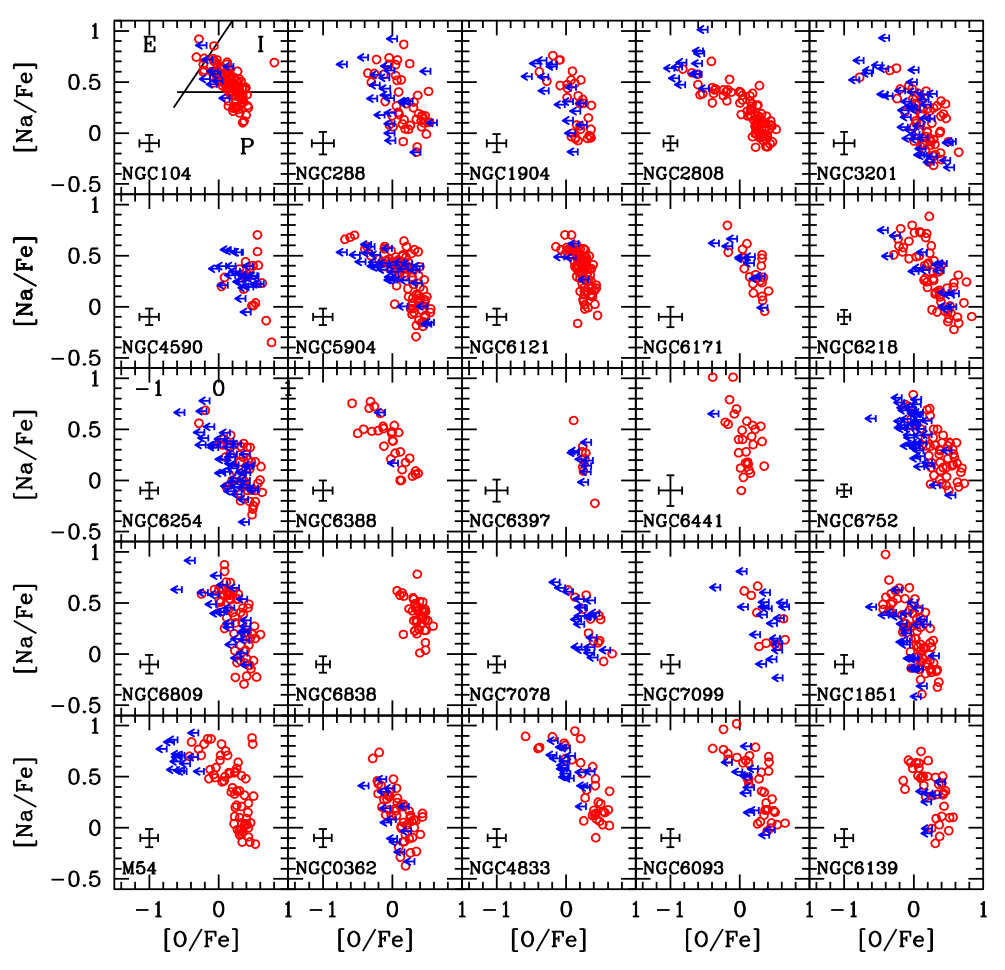Multiple populations in Globular Clusters: the Na-O FLAMES survey
The main contributors to this project are Eugenio Carretta and Angela Bragaglia (at OAS Bologna), Raffaele Gratton and Sara Lucatello (at OA Padova), Valentina D’Orazi (OA Padova / Univ. Roma Tor Vergata), but many more researchers both in Bologna, in Italy and worldwide are collaborating.
The Galactic globular clusters are now widely recognized as complex stellar systems, where different populations (generations) of stars (with small age difference but even hugely different chemical composition) coexist. This is demonstrated by evidence both spectroscopic (peculiar chemistry patterns) and photometric (spread or split evolutionary sequences in the colour-magnitude diagrams).
Among the chemical signatures, the Na-O anticorrelations in GC stars (see figure below) is the most evident and widespread manifestation of the action of proton-burning reactions at high temperature in stars of the first generation, more massive than the ones alive today. The ejecta from these first-generation stars polluted the intracluster gas from which the currently observed second-generation stars formed. Both first and second-generations stars are seen in the GCs.
We are studying the chemical composition of more than 25 MW GCs using the multi-object, high-resolution spectrograph FLAMES@VLT. We obtain mainly Fe, Na, and O abundances (but also of alpha-elements, Fe-group and neutron-capture elements) from spectra of about 3000 stars. This is the largest homogeneous analysis of GCs abundances. It permitted to quantitatively study the Na-O anticorrelation and its relations with clusters’ properties (mass, metallicity, age, location in the Galaxy, horizontal branch morphology, etc). A by-product of our survey is a new, homogeneous scale of metallicity for GCs, based on high-resolution spectra. Results have been published in a long series of papers starting from 2001 and still on-going, both on individual clusters and on the properties of the GC system and the relations between properties. Reviews have been published in 2004, 2012, and 2019 (see Gratton, Sneden, Carretta 2004; Gratton, Carretta, Bragaglia 2012; and Gratton, Bragaglia, Carretta, et al. 2019).
Analysis of individual clusters
- NGC 104 (47 Tuc) : Carretta et al. 2009a, Carretta et al. 2009b, D’Orazi et al. 2010, Carretta et al. 2013a, Gratton et al. 2013
- NGC 288 : Carretta et al. 2009a, Carretta et al. 2009b
- NGC 362 : Carretta et al. 2013b, D’Orazi et al. 2015a, D’Orazi et al. 2015b
- NGC1851 :Carretta et al. 2010a, Carretta et al. 2011, Carretta et al. 2012b, Gratton et al. 2012a
- NGC1904 (M79) : Carretta et al. 2009a, Carretta et al. 2009b, D’Orazi et al. 2015b
- NGC2808 :Carretta et al. 2006, Bragaglia et al. 2010, Gratton et al. 2012a, D’Orazi et al. 2015b, Carretta 2015, Carretta et al 2018
- NGC3201 : Carretta et al. 2009a, Carretta et al. 2009b, Carretta et al. 2010b
- NGC4590 (M68) : Carretta et al. 2009a, Carretta et al. 2009b
- NGC4833 : Carretta et al. 2014b, Carretta 2021
- NGC5634: Carretta et al 2017
- NGC5904 (M5) : Carretta et al. 2009a, Carretta et al. 2009b, Gratton et al. 2013
- NGC6093 (M80) : Carretta et al. 2015
- NGC6121 (M4) : Carretta et al. 2009a, Carretta et al. 2009b, Carretta et al. 2013a
- NGC6139 : Bragaglia et al. (2015)
- NGC6171 (M107) : Carretta et al. 2009a, Carretta et al. 2009b
- NGC6219 (M12) : Carretta et al. 2007a
- NGC6254 (M10) : Carretta et al. 2009a, Carretta et al. 2009b
- NGC6388 : Carretta et al. 2007c, Carretta & Bragaglia 2018, Carretta & Bragaglia 2019, Carretta & Bragaglia 2022a, Carretta & Bragaglia 2022b, Carretta & Bragaglia 2023
- NGC 6397 : Carretta et al. 2009a, Carretta et al. 2009b
- NGC6441 : Gratton et al. 2006, Gratton et al. 2007
- NGC6535: Bragaglia et al. 2017
- NGC6715 (M54):Carretta et al. 2010c, Carretta et al. 2010d, Carretta 2022
- NGC6752 :Carretta et al. 2007b, Carretta et al. 2012c
- NGC6809 (M55) : Carretta et al. 2009a, Carretta et al. 2009b
- NGC6838 (M71) : Carretta et al. 2009a, Carretta et al. 2009b
- NGC7078 (M15) : Carretta et al. 2009a, Carretta et al. 2009b
- NGC7099 (M30) : Carretta et al. 2009a, Carretta et al. 2009b
- Terzan8 : Carretta et al. 2014a

